Quarantine Read online
QUARANTINE
Greg Egan
Copyright © Greg Egan 1992 All rights reserved
The right of Greg Egan to be identified as the author of this work has been asserted by him in accordance with the Copyright, Designs and Patents Act 1988.
This edition published in Great Britain in 1999 by Millennium An imprint of Victor Gollancz Orion House, 5 Upper St Martin's Lane, London WC2H 9EA
To receive information on the Millennium list, e-mail us at: [email protected]
A CIP catalogue record for this book is available from the British Library
ISBN 1 85798 590 7
Printed in Great Britain by Clays Ltd, St Ives pic
PART ONE
1
Only the most paranoid clients phone me in my sleep.
Of course, nobody wants a sensitive call electronically decoded and flashed up on the screen of an ordinary videophone; even if the room isn't bugged, radio-frequency spillage from the unscrambled signal can be picked up a block away. Most people, though, are content with the usual solution: a neural modification enabling the brain to perform the decoding itself, passing the results directly to the visual and auditory centres. The mod I use, CypherClerk (NeuroComm, $5,999), also provides a virtual larynx option, for complete two-way security.
However. Even the brain leaks faint electric and magnetic fields. A superconducting detector planted on the scalp, no bigger than a flake of dandruff, can eavesdrop on the neural data flow involved in an act of ersatz perception, and translate it almost instantaneously into the corresponding images and sounds.
Hence The Night Switchboard (Axon, $17,999). The nano-machines which carry out this modification can take up to six weeks to map the user's idiosyncratic schemata -the rules by which meanings are encoded in neural connections - but once that's done, the intermediary language of the senses can be bypassed completely. What the caller wants you to know, you know, without any need to hallucinate a talking head spelling it out, and the electromagnetic signature at skull level is, for all practical purposes, inscrutable. The only catch is, in the conscious state, most people find it disorienting - and at worst traumatic - to have information crystallizing in their heads without the conventional preliminaries. So, you have to be asleep to take the call.
No dreams; I simply wake, knowing:
Laura Andrews is thirty-two years old, one hundred
3
and fifty-six centimetres tall, and weighs forty-five kilograms. Short, straight brown hair; pale blue eyes; a long, thin nose. Anglo-Irish features and deep black skin; like most Australians, born with insufficient UV protection, she's been retrofitted with genes for boosted melanin production and a thicker epidermis.
Laura Andrews has severe congenital brain damage; she can walk and eat, clumsily, but she can't communicate in any fashion, and the experts say that she understands the world little better than a six-month-old child. Since the age of five, she's been an in-patient at the local Hilgemann Institute.
Four weeks ago, when an orderly unlocked her room to serve breakfast, she was gone. After a search of the building and grounds, the police were called in. They repeated and extended the search, and conducted a doorknock of the surrounding area, to no avail. Laura's room bore no signs of forced entry, and recordings from security cameras proved unenlightening. The police interviewed the staff at length, but nobody broke down and owned up to spiriting the woman away.
Four weeks later, nothing. No sightings. No corpse. No ransom demands. The police have not officially abandoned the case - merely deprioritized it, pending further developments.
Further developments are not anticipated.
My task is to find Laura Andrews and return her safely to the Hilgemann - or locate her remains, if she's dead -and to gather sufficient evidence to ensure that those responsible for her abduction can be prosecuted.
My anonymous client presumes that Laura was kidnapped, but declines to suggest a motive. Right now, my judgement is suspended. I'm in no state to hold an opinion on the matter; I have a head full of received knowledge, coloured by my client's perspective, possibly even tainted with lies.
I open my eyes, then drag myself out of bed and over to the terminal in the corner of the room; I make it a policy never to deal with financial matters in my head. A few
4
keystrokes confirm that my account has been provisionally credited with a satisfactory down payment; accepting the deposit will signal to the client that I've taken the case. I pause for a moment to think back over the details of the assignment, trying to reassure myself that I really do understand it - there's always a hint of dream-logic to these calls, a faint but implacable suspicion that by morning none of what I've learnt will even make sense -then I authorize the transaction.
It's a hot night. I step out on to the balcony and look down towards the river. Even at three in the morning, the water is crowded with pleasure craft of every size, from luminescent sailboards, softly glowing orange or lime green, to twelve-metre yachts, crisscrossed with spotlight beams brighter than daylight. The three main bridges are thick with cyclists and pedestrians. To the east, giant holograms of cards, dice and champagne glasses strobe and pirouette above the casino. Doesn't anyone sleep any more?
I glance up at the empty black sky, and find myself, inexplicably, entranced. There's no moon tonight, no clouds, no planets, and the featureless darkness refuses to sustain any comforting illusion of scale; I might be staring at infinity, or the backs of my own eyelids. A wave of nausea passes through me, a contradictory mixture of claustrophobia and a dizzying sense of The Bubble's inhuman dimensions. I shudder-a single, violent twitch-then the feeling is gone.
A mod-generated hallucination of my dead wife Karen, standing on the balcony beside me, slips an arm around my waist and says, 'Nick? What is it?' Her touch is cool, and she spreads her fingers wide across my abdomen, like antennae. I'm on the verge of asking her, by way of explanation, if she ever misses the stars, when I realize how ludicrously sentimental that would sound, and I stop myself in time.
I shake my head. 'Nothing.'
The grounds of the Hilgemann Institute are as lushly
5
green as genetic engineering - and brute-force reticulation - can make them, in the middle of a summer when they ought to be dead and brown. The lawn glistens in the midmorning heat as if fresh with dew, no doubt constantly irrigated from just beneath the surface, and I trudge down the main access road in the shade of what looks like a kind of maple. An expensive image to maintain; the rates for frivolous water use, already punitive, are tipped to double in the next few months. The third Kimberley pipeline, bringing water from dams twenty-five hundred kilometres to the north, is four hundred per cent over budget so far, and plans for a desalination plant have been shelved, yet again - apparently, a glut on the ocean minerals market has undermined the project's viability.
The road ends in a circular driveway, enclosing a lavish flower bed in spectacular polychromatic bloom. The trademark IS gene-tailored hummingbirds hover and dart above the flowers; I pause for a moment to watch them, hoping - in vain - to witness just one contravene its programming by straying from the circle.
The building itself is all mock-timber; the layout suggests a motel. There are Hilgemann Institutes around the world, through no fault of anyone called Hilgemann; it's widely known that International Services paid their marketing consultants a small fortune to come up with the 'optimal' name for their psychiatric hospital division. (Whether public knowledge of the name's origin spoils the optimization, or is in fact the strongest basis for it, I'm not sure.) IS also runs medical hospitals, child-care centres, schools, universities, prisons and, recently, several monasteries and convents. They all look like motels to me.
I head fo
r the reception desk, but there's no need.
'Mr Stavrianos?'
Dr Cheng - the Deputy Medical Director, whom I spoke with briefly on the phone - is already waiting in the lobby, an unusual courtesy, which, politely, deprives me of any chance to poke my unsupervised head around corners. No white coats here; her dress bears an intricate,
6
Escher-like design of interlocking flowers and birds. She guides me through a staff only door and a tight maze of corridors to her office. We sit in padded armchairs, away from her spartan desk.
"Thank you for seeing me at such short notice.'
'Not at all. We're more than happy to cooperate; we're as anxious to find Laura as anyone. But I must say I have no idea what her sister is hoping to achieve by suing us. It's not going to help Laura, is it?'
I make a sympathetic but non-committal noise. Perhaps the sister, or her law firm, is my client - but if so, why all the pointless secrecy? Even if I hadn't barged in here and announced myself to the opposition - and I received no instructions not to - the Hilgemann's lawyers would have taken it for granted that she'd hire an investigator, sooner or later. They would have hired their own, long ago.
'Tell me what you think happened to Laura.'
Dr Cheng frowns. 'I'm sure of one thing: she can't have escaped by herself. Laura couldn't even turn a door handle. Someone took her. Now, we don't run a prison here, but we do take security very seriously. Only a highly skilled, highly resourced professional could have removed her - but on whose behalf, and to what end, I can't imagine. It's getting a bit late for ransom demands, and in any case, her sister isn't well off.'
'Could they have taken the wrong person? Maybe they intended to kidnap another patient - someone whose relatives could raise a worthwhile ransom - and only realized their mistake when it was too late to do anything about it.'
Ί suppose that's possible.'
'Any obvious targets? Any patients with particularly wealthy -' Ί really can't -'
'No, of course not. Forgive me.' From the look on her face, I'd say she has several candidates in mind - and the last thing in the world she wants is for me to approach their families. Ί take it you've stepped up security?'
7
'I'm afraid I can't discuss that either.' 'No. Tell me about Laura, then. Why was she born brain-damaged? What was the cause?' 'We can't be sure.'
'No, but you must have some idea. What are the possibilities? Rubella? Syphilis? AIDS? Maternal drug abuse? Side-effects from a pharmaceutical, or a pesticide, or a food additive. . . ?'
She shakes her head dismissively. 'Almost certainly none of those. Her mother went through standard prenatal health care; she had no major illness, and she wasn't using drugs. And a chemical teratogen or mutagen doesn't really fit in with Laura's condition. Laura has no malformation, no biochemical imbalance, no defective proteins, no histological abnormalities -'
'Then why is she massively retarded?'
'It looks as if certain crucial pathways in the brain, certain systems of neural connections which should have formed at a very early age, failed to appear in Laura's case - and their absence made subsequent normal development impossible. The question is why those early pathways didn't form. As I've said, we can't be sure - but I suspect it was a complex genetic effect, something quite subtle involving the interaction of a number of separate genes, in utero.'
'Couldn't you tell, though, if it was genetic? Couldn't you test her DNA?'
'She has no recognized, catalogued genetic defects, if that's what you mean - which only proves that there are genes crucial to brain development yet to be located.'
'Any family history of the same thing?'
'No, but if several genes are involved, that's not necessarily surprising - the chance of a relative sharing the condition could be quite small.' She frowns. 'I'm sorry, but how is any of this going to help you find her?'
'Well, if a pharmaceutical or a consumer product were the cause, the manufacturers might be safeguarding their interests. It's a long time after the event, I know, but maybe some obscure birth-defects research team is on the
8
verge of publishing the claim that wonder drug X, the miracle antidepressant of the thirties, makes one foetus per hundred thousand turn out like Laura. You must have heard about Holistic Health Products, in the States; six hundred people suffered kidney failure from taking their "energy supplement", so they hired a dozen hit men to start wiping out the victims, faking accidental deaths. Corpses attract much smaller damages verdicts. Okay, kidnapping doesn't seem to make much sense, but who knows? Maybe they needed to study Laura, to extract some kind of information that might eventually help them in court.'
'It all sounds rather paranoid to me.' I shrug. Occupational hazard.' She laughs. 'Yours, or mine? Anyway, I've told you, I think the cause was inherited.' 'But you can't be positive.' 'No.'
I ask the usual questions about the staff: anyone hired or fired in the last few months, anyone known to have debts or problems, anyone with a grudge? The cops would have been through all of this, but after four weeks of brooding on the disappearance, some trivial matter, not worth mentioning at first, may have come to assume greater significance.
No such luck.
'Can I see her room?'
'Certainly.'
The corridors we pass through have cameras mounted on the ceiling, at ten-metre intervals; I'd guess that any approach to Laura's room is covered by at least seven. Seven data chameleons, though, would not have been beyond the budget of a serious kidnapper; each pinhead-sized robot would have tapped into one camera's signal, memorized the sequence of bits for a single frame while the corridor was empty, then spat it out repeatedly, replacing the real image. There may have been faint patches of high-frequency noise when the fake data was switched in and out - but not enough to leave tell-tale
9
imperfections on a noise-tolerant digital recording. Short of subjecting every last metre of optical fibre to electron microscopy, hunting for the tiny scars where the chameleons intervened, it's impossible to know whether or not such tampering ever took place.
The door - remotely locked and unlocked - would have been just as easy to interfere with.
The room itself is small and sparsely furnished. One wall is painted with a cheerful, glossy mural of flowers and birds; not something I'd care to wake up to, personally, but I can hardly judge how Laura would have felt. There's a single large window by the bed, set solidly into the wall, with no pretence that it was ever designed to be opened. The pane is high-impact plastic; even a bullet wouldn't shatter it, but with the right equipment it could be cut and resealed, leaving no visible seam. I draw my pocket camera and take a snapshot of the window in the polarized light of a laser flash, then I process the image into a false-colour stress map, but the contours are smooth and orderly, betraying no flaws.
The truth is, there's nothing I can do here that the police forensic team would not have done first, and better. The carpet would have been holographed for footprint impressions, then vacuumed for fibres and biological detritus; the bed sheets taken away for analysis; the ground outside the window scoured for microscopic clues. But at least I have the room itself fixed in my mind now; a solid backdrop for any speculations about the night's events.
Dr Cheng escorts me back to the lobby.
'Can I ask you something that has nothing to do with Laura?'
'What?'
'Do you have many patients here with Bubble Fever?' She laughs and shakes her head. 'Not one. Bubble Fever has gone right out of fashion.'
Because I am in business, and because I might - in theory - give credit, there's a certain amount I can find out about anyone, with no effort at all.
10
Martha Andrews is thirty-nine years old, and works as a systems analyst for WestRail. She is divorced, with custody of her two sons. She has an average income and average debts, and forty-two per cent equity in a cheap two-bedroom flat. She's been paying the Hilgemann out of
a trust fund left by her parents; her father died three years ago, her mother the year after. She is not worth extorting.
At this stage, the most plausible hypothesis seems to be one of mistaken identity; it doesn't fit well with the professionalism of the kidnapping, but nobody's perfect. What I need, to take the idea any further, is a list of the Hilgemann's patients. Details of the staff might also come in handy.
I call my usual hacking service.
The ringing tone seems to reverberate deep within my skull. There's no doubt that NeuroComm's product psychologists chose these bizarre acoustics to give a strong impression of privacy, but I'm not impressed; it just makes me feel claustrophobic. At the same time, my external vision fades to black-and-white - supposedly to lessen the distraction, but in fact it's just one more tedious gimmick.
Bella answers on the fourth ring, as always. Her face seems to hover about a metre away, vivid against reality's greys, vanishing at the neck as if revealed by some magical spotlight. She smiles coolly. 'Andrew, it's good to see you. What can I do for you?' 'Andrew' is the name I use for one of my CypherClerk masks. Her own synthetic human visage might also be nothing but a mask, repeating word for word the speech intentions of an actual person -or it might be a pure artifact, the interface to anything from a glorified answering machine to a system that actually does ninety-nine per cent of the hacking itself. I really don't care who or what Bella is; she/he/it/they get results, and that's all that matters to me.
'The Hilgemann Institute, Perth branch. I want all their patient records, and all their staff records.'
'Back how far?'
11
'Well. . . thirty years, if it's on line. If the old stuff is archived, and it's going to cost a fortune to get your hands on it, forget it.'
She nods. 'Two thousand dollars.'
I know better than to try to haggle. 'Fine.'
'Call back in four hours. Your password is "paradigm".'
As the room regains its normal hues, it strikes me that two thousand dollars would be a lot of money to Martha Andrews - not to mention the fifteen thousand I've already received in advance. Of course, if her lawyers were confident of a large settlement and a fat contingency fee, fifteen thousand would be nothing to them. Their wish to be anonymous might be no more sinister than my own use of a pseudonym with Bella; when laws are being broken, it's nice to have bulkheads against the risk of a conspiracy charge.

 Zendegi
Zendegi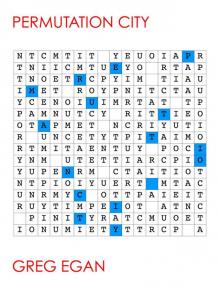 Permutation City
Permutation City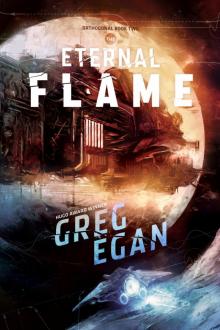 The Eternal Flame
The Eternal Flame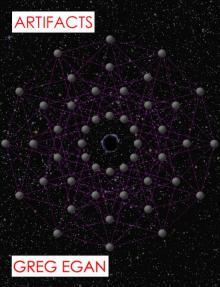 Artifacts
Artifacts Wang's Carpets
Wang's Carpets Dichronauts
Dichronauts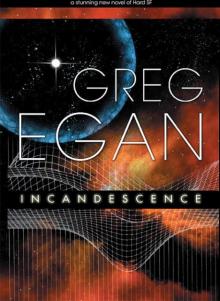 Incandescence
Incandescence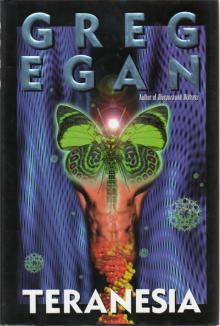 Teranesia
Teranesia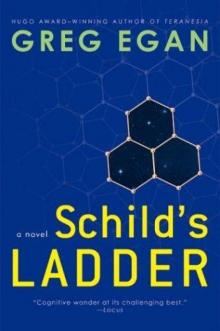 Schild's Ladder
Schild's Ladder Quarantine
Quarantine The Four Thousand, the Eight Hundred
The Four Thousand, the Eight Hundred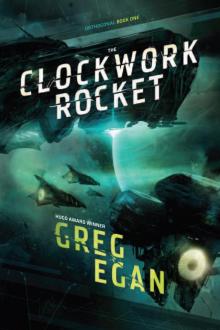 The Clockwork Rocket
The Clockwork Rocket Zeitgeber
Zeitgeber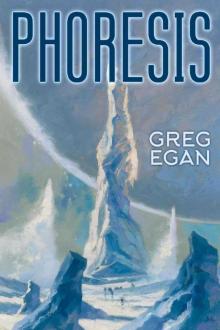 Phoresis
Phoresis The Nearest
The Nearest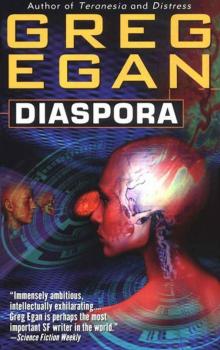 Diaspora
Diaspora Instantiation
Instantiation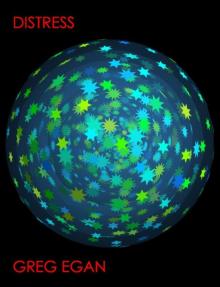 Distress
Distress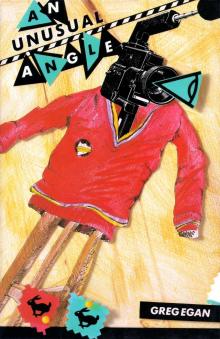 An Unusual Angle
An Unusual Angle Oceanic
Oceanic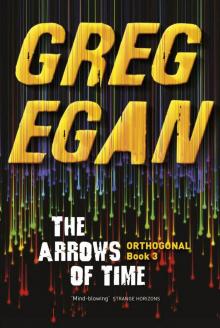 The Arrows of Time
The Arrows of Time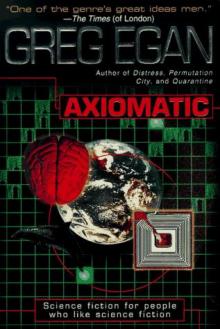 Axiomatic
Axiomatic![Anthology 2. Luminous [1998, 2010] Read online](http://i1.bookreadfree.com/i/03/18/anthology_2_luminous_1998_2010_preview.jpg) Anthology 2. Luminous [1998, 2010]
Anthology 2. Luminous [1998, 2010] Perihelion Summer
Perihelion Summer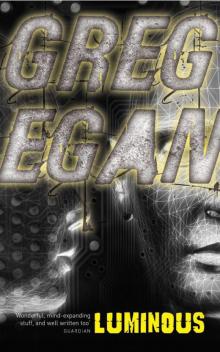 Luminous
Luminous